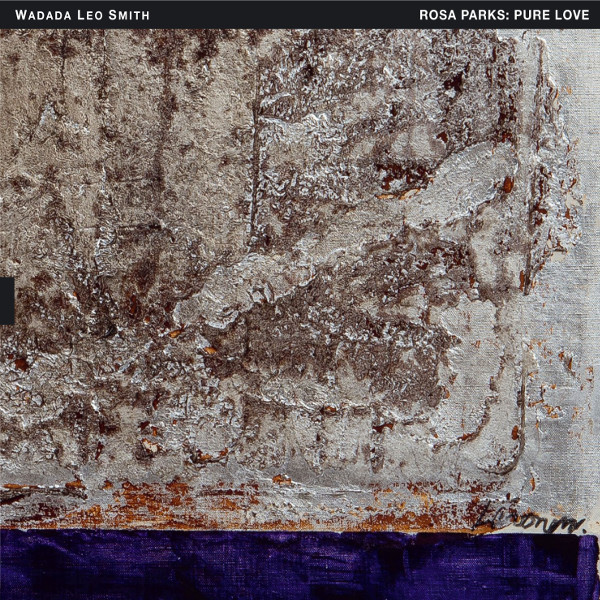
Exposé Online
What's old
Exposé print issues (1993-2011)
- 1 (October 1993)
- 2 (February 1994)
- 3 (May 1994)
- 4 (August 1994)
- 5 (October 1994)
- 6 (March 1995)
- 7 (July 1995)
- 8 (November 1995)
- 9 (March 1996)
- 10 (August 1996)
- 11 (February 1997)
- 12 (May 1997)
- 13 (October 1997)
- 14 (February 1998)
- 15 (July 1998)
- 16 (January 1999)
- 17 (April 1999)
- 18 (November 1999)
- 19 (May 2000)
- 20 (October 2000)
- 21 (March 2001)
- 22 (July 2001)
- 23 (December 2001)
- 24 (April 2002)
- 25 (September 2002)
- 26 (February 2003)
- 27 (August 2003)
- 28 (December 2003)
- 29 (April 2004)
- 30 (September 2004)
- 31 (March 2005)
- 32 (September 2005)
- 33 (May 2006)
- 34 (March 2007)
- 35 (January 2008)
- 36 (October 2008)
- 37 (July 2009)
- 38 (July 2010)
- 39 (Summer 2011)
Reviews
Wadada Leo Smith — Rosa Parks: Pure Love. An Oratorio of Seven Songs
(TUM Records 057, 2019, CD)
by Jon Davis, Published 2019-11-01

Wadada Leo Smith’s tribute to and meditation on civil rights icon Rosa Parks takes the form of an oratorio, seven songs interspersed among instrumental passages for a variety of different instrumental combinations, including some pre-existing recordings of music by Anthony Braxton, Steve McCall, Leroy Jenkins, and Smith himself.
First up, let’s look at the building blocks Smith uses to construct this ambitious work. The first ensemble encountered is BlueTrumpet Quartet — Smith, Ted Daniel, Graham Haynes, and Hugh Ragin on trumpets — with drum kit by Pheeroan akLaff. They are joined shortly by RedKoral Quartet — Shalini Vijayan (violin), Mona Tian (violin), Andrew McIntosh (viola), and Ashley Walters (cello) — and Velibor “Hardedge” Pedevsky on electronics. The first song introduces Min Xiao-Fen on voice and pipa; the second is sung by Carmina Escobar. The last participant introduced is singer Karen Parks. These musicians, along with the pre-existing recordings, appear in various combinations during the 75 minute work, and nearly every one of them has a featured solo spot.
Now, for the music itself… Elements of jazz and modern classical music fuse seamlessly, with the string quartet especially deserving of mention for their fluency on the challenging parts, which are full of extended techniques. The trumpets are used in a variety of ways, sometimes providing clusters of notes, sometimes disconnected fanfares, sometimes wandering melodic snippets. All three singers have powerful voices, coming from three different realms of music: Parks from Western opera; Escobar from modern experimentation; and Min from Chinese classical and experimental music. Min’s pipa appears only in “Song 1,” providing a color that never reappears. As with the string parts, the vocal lines are challenging, avoiding simple tonal melodies for sweeping lines that illustrate the words and make no concessions to popular forms. While Pedevsky’s electronics are subtle enough to be nearly undetectable much of the time, akLaff’s drums provide real excitement when they appear, with freely flowing rhythms far removed from jazz. In the liner notes, Smith explains his recent turning away from the term “improvisation” for the act of creating music in the moment. He simply refers to it as “creating music,” and there is some of that in Rosa Parks, though exactly how much is difficult to say — and irrelevant to the impact of the sounds. No identifiable jazz idioms are heard. Smith also describes the staging for performing the oratorio — where the performers are positioned, how they are lit, and even what kinds of microphones are to be used. These details will have no impact on those who listen to the CD (especially since there are no photographs of a performance in the book), but are indicative of Smith’s vision for the work. Listeners who like their music to have clear stylistic boundaries will likely feel disoriented by Rosa Parks, as it is described as contemporary art music, expansive in vision and ambition, and executed by musicians of extraordinary capability.
Filed under: New releases, 2019 releases
Related artist(s): Wadada Leo Smith
What's new
These are the most recent changes made to artists, releases, and articles.
- Review: Steve Tibbetts - Close
Published 2026-02-28 - Release: We Stood Like Kings - Pinocchio
Updated 2026-02-27 19:24:02 - Release: Stephen Grew - Pianoply
Updated 2026-02-27 19:20:11 - Release: Thierry Zaboitzeff - Artefacts
Updated 2026-02-27 00:16:46 - Review: Kevin Kastning - Codex I & Codex II
Published 2026-02-27 - Release: Zan Zone - The Rock Is Still Rollin'
Updated 2026-02-26 23:26:09 - Release: The Leemoo Gang - A Family Business
Updated 2026-02-26 23:07:29 - Release: Ciolkowska - Bomba Nastoyashchego
Updated 2026-02-26 13:08:55 - Review: Immensity Crumb - Chamber Music for Sleeping Giants
Published 2026-02-26 - Release: The Gatekeepers - Diary of a Teenage Prophet
Updated 2026-02-25 15:55:58 - Review: Mars Lasar - Grand Canyon
Published 2026-02-25 - Listen and discover: Mordecai Smyth will not break your back
Published 2026-02-25 - Release: Tashi Wada - What Is Not Strange?
Updated 2026-02-24 14:56:16 - Artist: Tashi Wada
Updated 2026-02-24 14:54:34 - Release: Greg Segal - Maintain!
Updated 2026-02-24 00:38:03 - Review: Il Segno del Comando - Sublimazione - Live
Published 2026-02-24 - Review: Nektar - Mission to Mars & Fortyfied
Published 2026-02-23 - Review: Jaime Rosas - Tres Piezas de Rock Progresivo
Published 2026-02-22
